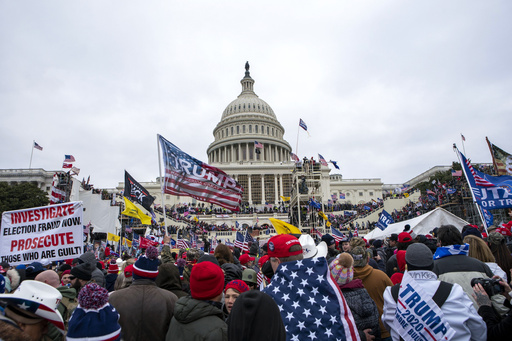
Former President Donald Trump made a notable comparison on Friday between individuals detained for their involvement in the January 6, 2021, Capitol riot and the over 120,000 Japanese Americans who were interned in the United States during World War II.
“Why are they still being held? Nobody’s ever been treated like this,” Trump stated during an interview with conservative commentator Dan Bongino, further adding, “Maybe the Japanese during the Second World War, frankly. They were held, too.”
As a candidate for the Republican presidential nomination, Trump has often downplayed the severity of the Capitol riot, describing it earlier this week as a “day of love.” On that day, approximately 140 law enforcement officers sustained injuries, marking it as one of the most significant attacks on American police forces in a single day. Tragically, Ashli Babbitt, a supporter of Trump, was shot and killed by law enforcement during the chaos.
In previous remarks, Trump has condemned the treatment of the rioters, labeling them as “horribly treated,” and referred to the individuals still in custody as “hostages” and “victims.” He has consistently called for their release and suggested that he would consider pardoning them if he returned to office.
Responding to Trump’s comments, Vice President Kamala Harris accused him of manipulating the narrative surrounding the events of January 6.
Historically, the federal government detained around 120,000 individuals of Japanese descent, including U.S. citizens, following an executive order issued by President Franklin D. Roosevelt in February 1942. A congressional panel in 1983 determined that the internments were primarily driven by “racial prejudice, war hysteria, and failure of political leadership,” prompting a formal apology and reparations of $20,000 each to the affected individuals five years later.
Sharon Yamato, whose parents experienced internment, criticized Trump’s analogy, stating, “Japanese Americans are not and should not be compared to insurrectionists who committed major crimes and in which people were hurt and killed. I think that is just so horrible to try to even make that comparison or allege that there’s any similarities between the two.”
Trump also claimed that the defendants from January 6 “won in the Supreme Court,” alluding to a ruling from June that narrowed a federal obstruction statute previously applied in numerous Capitol riot cases, including against Trump himself.
The decision by the Supreme Court, penned by Chief Justice John Roberts, was a 6-3 ruling emphasizing that the charge of obstructing an official proceeding necessitates evidence of attempts to tamper with or destroy evidence. However, most of the nearly 1,000 individuals who have been convicted of Capitol riot-related offenses were not charged with obstruction and will not benefit from this ruling.
It is noteworthy that Trump, facing charges himself connected to that statute due to an investigation led by special counsel Jack Smith, has indicated that the Supreme Court ruling should not influence the prosecution ongoing against him regarding alleged efforts to overturn the 2020 election.
In his public statements, Trump continues to assert that he only encouraged his followers to demonstrate “peacefully.” During his address on the morning of the riot, he directed the crowds to march “peacefully and patriotically” toward the Capitol. Nevertheless, in off-the-cuff remarks, he utilized significantly more provocative language, declaring, “We fight like hell. And if you don’t fight like hell, you’re not going to have a country anymore.”
